
How to Write PPC Ad Copy Using AI
It’s no secret: the world of PPC advertising is not for the faint-hearted. If you don’t know what you’re doing, you could end up throwing money down the drain.
How can you increase the chances of the right people clicking on your ads? You need to learn how to write ad copy that converts.
Thankfully, technological advancements like artificial intelligence (AI) are here to save the day. AI tools can help you write ad copy that produces results.
How Can Artificial Intelligence Help Your PPC Campaigns?
Just so we’re on the same page, let’s quickly look at a simple definition of AI.
Artificial intelligence (AI) is a multidisciplinary branch of science that includes machine learning (ML), natural language processing (NLP), deep learning, and many other emerging technologies.
The main benefits of AI when it comes to creating compelling PPC ad copy include:
- Unmatched data processing power
- Ability to better “predict” click-through rates and quality scores
- Identify bids that will get the most traffic
- Saves you time managing campaigns
However, no matter how much data you have at your fingertips and how well you can identify lucrative bids, all that will be to no avail if your ad copy sucks.
AI can help you with that. I’ll show you how below.
6 Ways AI Can Help You Write Good PPC Ad Copy
Many tools can help you write ad copy. However, many AI-powered tools have one huge advantage: unlike their predecessors that relied on historical data, AI-powered tools give you real-time data. This process allows you to refine your copy to better suit the market situation when the content is created and published.
These are tips that will help optimize your ad copy, whether you’re advertising on Google, Bing, Facebook, or any other of the myriad platforms available.
Use AI for Audience Research
The very first thing you need to do before writing ad copy is to understand your target audience. The key to successful ad copy is to know not only who your target audience is, but also to know:
- What they’re looking for
- Why they’re looking for it
In short, understanding your audience will help you understand the intent behind your prospect’s search. Knowing this could help you write personalized ad copy that will resonate with your audience, eliciting a click through to your offer.
It will also help you create ads that are so targeted that only the right people will click on them. Additionally, it will help you write ad copy that addresses any objections your audience may have.
When you know how to write ad copy that speaks directly to your audience, you’ll likely enjoy a reduction in wasted clicks and an increase in your return on ad spend (ROAS).
How do you get to know your audience? This process is where AI shines best.
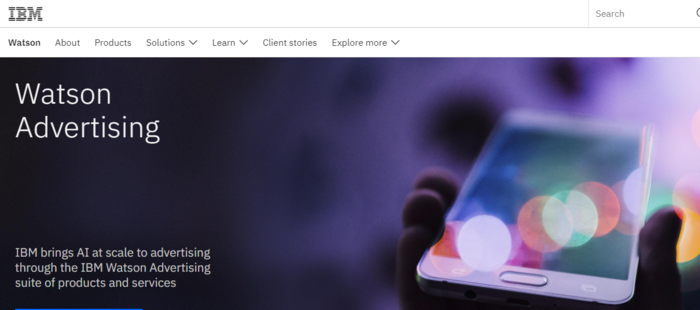
AI-powered audience research tools like IBM’s Watson are great for helping you with predictive audiences. These consumers may not look anything alike but have some common threads that make them relevant targets for your PPC ads. By processing data from multiple sources, AI helps you understand the type of people you should target with your ads.
These insights help you significantly reduce the risk of ad waste, as your ad copy will be hyper-personalized, making it appealing to the right people. With ad spend steadily increasing across all industries, AI will help ensure that you get a good ROI from your campaigns.
Conduct Competitor Research Using AI
Before you put pen to paper, you must study the competitive environment.
You must conduct competitor research. This data will help you understand (among other things):
- The type of ad copy that generates clicks
- Ad formats that work best in your niche
- Opportunities your competitors are missing that you can leverage
The data you get from your competitors’ ad campaigns is invaluable in helping you know how to write ad copy that will perform exceptionally well.
This process is where AI-powered competitor research tools like Adthena come to play.
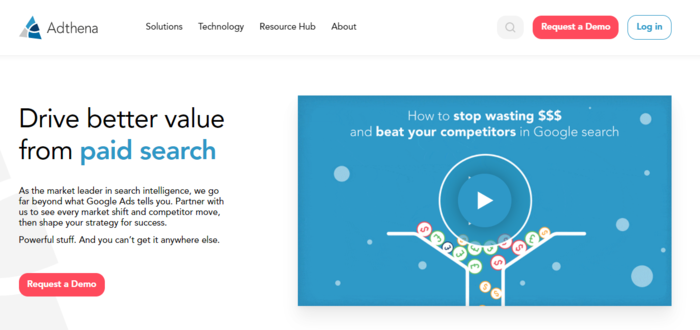
By gaining insights into your competitors’ PPC activity and market shifts, you’ll be better armed to write compelling PPC ad copy.
The real-time data AI technologies provide may help you gain or keep a corner the market by ensuring you’re up-to-date with trends and news that affect your market audience. Real-time data is also essential when conducting competitor analysis, as any lag in time could result in the competition cornering the market.
Don’t delay to get on the AI bandwagon, especially when it comes to writing ad copy.
AI Can Help You Discover Keyword Opportunities
Everyone knows keywords are the foundation of every good PPC campaign. Unfortunately, with more businesses vying for the same target audience, relevant keyword opportunities are becoming harder to find.
AI can help.
With the competition for profitable keywords being uber-stiff, normal keyword research just doesn’t cut it anymore. You must leverage AI to help you uncover hidden keyword gems.
This fact is especially true since keyword research for SEO and PPC is not the same. For PPC, your money rides or sinks on the keywords you use. That’s why you must find keywords that will give you a good return when you bid for them.
AI-powered tools like BrightEdge, for example, not only help you discover profitable keywords but are also able to give insight into the intent behind those keywords.
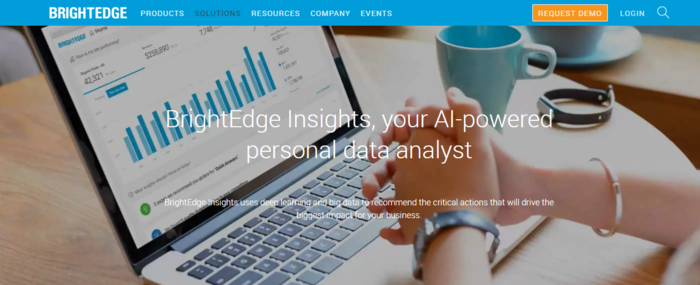
Because they offer real-time data, you are in a better position to write ad copy based on keyword opportunities as they arise. Of course, this will give you an edge over the competition, as your ads will have a better chance of being served to users while keeping your ad spend low.
Headline Optimization Is Easy with AI
Saying that your headline is a critical part of your ad copy is an understatement. Its value can never be overstated because it’s your first chance to hook your customers.
If your headers are poorly crafted, users will just scroll past your ad. But if you write your headline well, it will stop them from scrolling so they look at the rest of your ad copy. AI can help you craft headlines that stop people in their tracks by helping you write headlines that result in much-coveted clicks.
A great example is Persado. The AI-powered copywriting tool helped Chase Bank increase the CTR on their ads by as much as 450%. How? By crafting headlines that resonate more with their target audience.

There are AI-powered tools that are designed to help you optimize your headers to elicit users to click on your ads.
The success of your ad campaigns rides on your headlines.
The next part users look at is the ad description.
Use AI to Nail Your Ad Description
Next to your headline, your ad description is the most crucial part of your ad copy. While the headline is the hook that grabs your prospect’s attention, your ad description is the sales pitch that gets them to click on your ad.
However, there’s a catch: you have a limited number of characters to use to convince your prospects to click-through to your offer. This means every character counts. It must help elicit a positive reaction from users. That’s why you must make sure you know how to write ad copy that drives clicks.
Fortunately, AI can help you write compelling ad copy.
With AI copywriting tools like Phrasee, you don’t have to guess what kind of copy works.
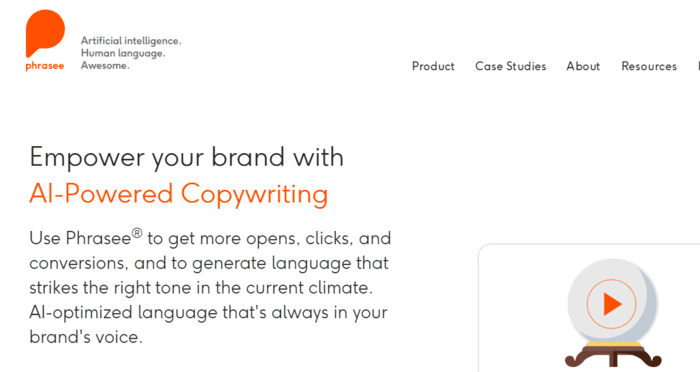
Using machine learning and gathering data from different platforms, AI copywriting tools have “mastered” the art of writing great ad copy.
Using machine learning (ML), natural language generation (NLG), deep learning, and other technologies, AI-powered copywriting tools can help you create compelling ad copy that stands out from the crowd. AI takes into consideration many facets, such as language, semantics, sentence structure, and a whole lot more to help you create optimized ad copy at scale.
Another great AI-powered ad creation tool you can consider is CopyAI.
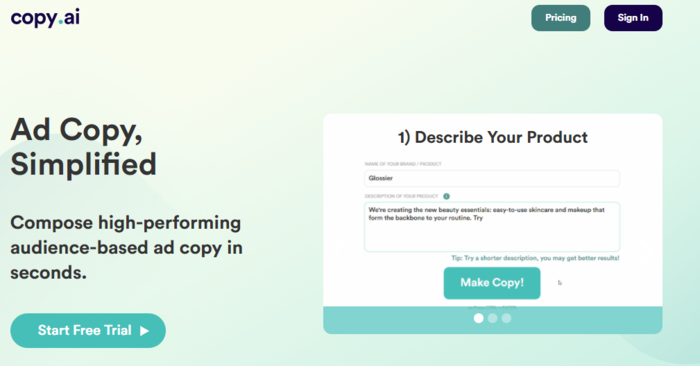
Copy AI is designed to take the grunt work out of brainstorming unique ad ideas. It will help you increase your ROAS by helping you come up with relevant audience-based copy that your customers won’t be able to resist. The deep learning platform that powers CopyAI can personalize your ad copy to suit any holiday, occasion, or campaign.
AI-powered copywriting tools are a great way to save time and money as they work faster and more efficiently. And at the end of the day, they’ll help you boost your bottom line.
Calls-to-Action: AI Can Help With That Too
Calls-to-action (CTAs) are a tricky part of writing ad copy. That’s because your CTA is usually made up of 2-5 words to inspire people to take action.
While platforms like Google and Facebook give you some CTA options to choose from as you create your campaigns, it’s always better to create your own CTAs. After all, if you use the options generated by search engines and social media platforms, you won’t stand out from the competition.
Your CTA plays a crucial role in pushing your prospects across the finish line. As such, give it careful consideration. You may get every other element of your ad copy correct, but if your CTA is weak, your hard work will be in vain.
What makes for a strong clickable CTA? One word: personalization.
Different audiences respond differently to CTAs. That’s why you must pay special attention to the language your audience uses and try as much as possible to implement it in your CTAs. This is one area where audience research pays off because it helps you craft personalized CTAs. Studies show that personalized CTAs perform up to 202% better than generic ones.
Note: make sure to create a different CTA for each campaign. Don’t just regurgitate past CTAs, even if they worked well in previous campaigns.
Yes, it may be a lot of work if you do it manually. That’s why you shouldn’t do it manually; use AI instead.
Again, tools like Persado make creating impactful CTAs easier.
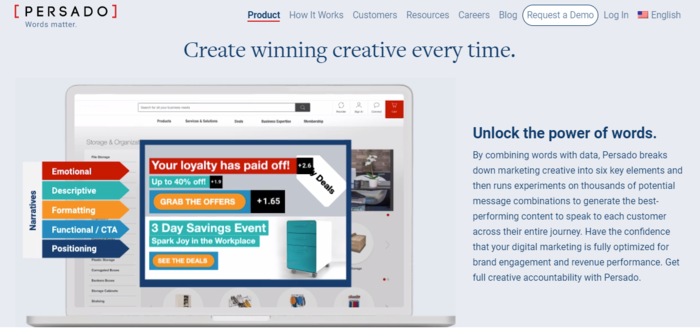
Leveraging data such as sentiment analysis (or emotion AI), AI-powered tools help you create CTAs that tug at your prospects’ heartstrings. Of course, every marketer knows that it is easier to loosen your prospects’ purse strings if you can do that.
By leveraging AI in crafting your CTAs, you increase your ad copy’s chances of achieving its goal of boosting your bottom line.
Conclusion
It’s impossible to ignore AI as a digital marketer. It’s everywhere around us. From AI SEO to AI in website design, every facet of digital marketing is becoming more efficient thanks to artificial intelligence.
As a marketer, if you’re looking to know how to write ad copy that converts, you must lean heavily on AI-powered tools to help you. From the planning stage to deployment, AI can help you optimize every part of your PPC ad campaigns.
Though remember: without good ad copy, your ad spend will be wasted. How do you write good ad copy? By using AI.
Sure, AI may not be able to handle the creative side of writing ad copy completely alone. However, it does go a long way in helping you create ad copy that sells.
Are you ready to embrace the power of AI in your ad copy creation?
The post How to Write PPC Ad Copy Using AI appeared first on Neil Patel.
